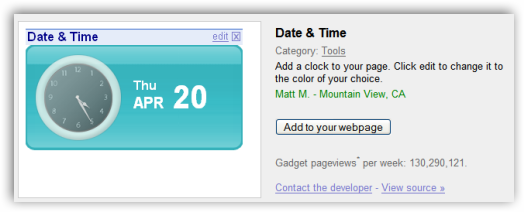Fortunately, it's very easy to see the numbers for almost any gadget (but not for feeds), so here's a list of some of the most popular gadgets:

* Date & Time - 130,290,121 page views per week
* Google Calendar - 91,491,639 page views per week
* Driving Directions - 38,615,797 page views per week
* Map Search - 31,460,719 page views per week
* Wikipedia search - 27,314,972 page views per week
* Dictionary.com search - 12,520,786 page views per week
* YouTube search - 9,515,502 page views per week
* Google Reader - 3,383,720 page views per week
Google explains that: "Gadget pageview statistics are approximate only (...) and represent the number of times that the gadget was rendered, including Google Personalized Homepage, Google Pages, Blogger, Google Desktop, and across thousands of independent pages around the web."

Pretty interesting lonut. At a minimum we seem to agree on the fact that Search's got to do something with an OS ... :-)
ReplyDeleteSmmes to me there is a shoft taking place with the Web coming out of the browser. Information retrieval is changing in real time. There is a shift taking place from going to a search engine to pull in results to answers being pushed to consumers.
Web 2.0 open standards have in essence separated the content we search from its format and dedicated application. Ajax and Flash have turned Web pages into applications. Web pages are now aggregations of widgets and feeds, sort or application RSS containers with smarts. Platform independent widgets, RSS feed aggregators, content delivery applications and players will increasingly be proactively pulling in content, marginalizing to some extent the results page as the Web’s main information retrieval tool.
-arnaud